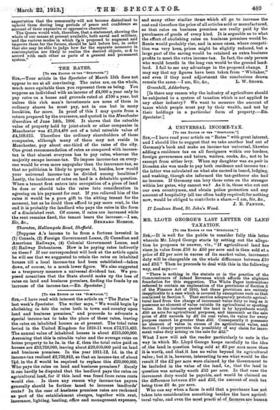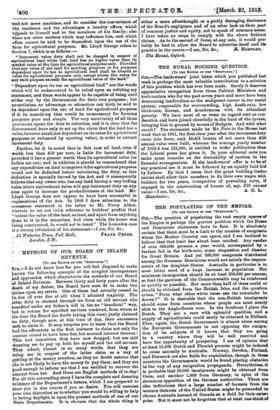MR. LLOYD GEORGE'S LAST LETTER ON LANIS' TAXATION. [To TIM
EDITOR OP THE "SPEC:CATO/4'] Sri,—It is well for the public to consider fully this letter wherein Mr. Lloyd George starts by setting out the allega- tion he proposes to- answer, viz., "If agricultural land has
risen in value from 210 to £50 per acre and is then sold at a price of £2 per acre in excess of its market value, increment duty will be chargeable on the whole difference between £10 and £52." Then he proceeds to deal with this in the following way, and says :—
" There is nothing in the statute or in the practice of the Commissioners of inland Revenue which affords the slightest foundation for this suggestion. The White Paper instructions referred to contain an explanation of the provisions of Section 2 of the Finance Act of 1910, but these provisions are entirely inapplicable to a case which is covered by exemptions such as that contained in Section 7. That section adequately protects agricul- tural land from the charge of increment value duty so long as it possesses no element of value outside its agricultural or sporting value. In the instance quoted the land is by hypothesis worth £50 an acre for agricultural purposes, and inasmuch as the sale price of £52 exceeds by £2 its real value, its value for every purpose cannot be greater than £50. Consequently it possesses no element of value in excess of its agricultural value, and Section 7 clearly prevents the possibihty of any claim for incre- ment value duty arising on the sale for 452.'' What I now will ask the reader particularly to note is the way in which Mr. Lloyd George keeps carefully to the idea of the land in question being sold at £2 per acre more than it is worth, and that,it has no value beyond its agricultural
value ; but it is, however, interesting to see what would be the
result if the £2 per acre were claimed by the. Government to be included in the value of the land, i.e., that the land in question was actually worth £52 per acre. In that case the increment duty would be payable, and would be claimed on
the difference between £10 and £52, the amount of such tax
being thus £8 4s. per acre.
Who can say when a farm is sold that a purchaser has not taken into consideration something besides the bare agricul- tural value, and even the most practi .al of farmers are human 'aiid-not mere machines, and do consider the donvenience of the residence and the advantages a locality offers, which 'appeals to himself and to the members of his family; also there are other matters which may influence him, and which -often cannot be said to be -dependent upon the use of the
-firm for agricultural purposes. Mr. Lloyd George refers to Section 7, whicleis-us follows :-- "Increment value duty shall not be ebavged in respect of agricaltgral land while that land has no higher value than its market value at the time for agricultural purposes only. Provided that any value of the land for sporting purposes or for purposes dependent npon its use as agricultural land shall be treated as value for agricultural purposes only, except where the value for, any inch purpOse exceeds the.agricultural value of the land."
"Dependent upon its use as 'agricultural land" are the words 'which will be endeavoured to be relied upon as refuting my -statement, and theae words appear to be capable of being used either way by the Government .for their own purposes ; but nevertheless no advantage or attraction can truly be said to be dependent upon-the use of land for agricultural purposes if it be something that would be unnecessary for farming purposes pure and simple. The very uncertainty of all these provisions opens the door-to- extortion, and it is clear that the Government, haveonly to set up the claim that land has a value, however srnell(not dependent on its value for agricultural
purposes or enhanced by sporting value), in order to -extract increment duty.
Further, let. it be-noted that in this case all land, even if worth less than £50 per acre, is liable for increment ditty, provided it has a greater worth than its agricultural value (as 'before set ont),.and in addition it should be remembered that any expenditure on land to improve it for agricultural purposes would net be deducted before calculating the duty, as this deduction is specially barred by the Act, and it consequently follows that any owner who has any land having a very trifling value above agricultural value-will pay increment duty on any sum spent to increase the productiveness of .the land. Mr. Lloyd George does- not appear to have been successful in explanations of the Act. In 1909 I drew attention to the erroneous statement in his letter to Mr. Percy Alden, wherein he set out (with reference to builders' profits) that "unless the value of-the-land-,-set land, and apart from anything
acne to it -in the-._ meantime, had risen while the house was being constructed, he would not be taxed." The Lnmsden case
is a strong refutation of his statement.—I am, Sir, &c.,
.413 -Waterloo Place, Pall Mall, FRANK PERKS,
..London,.S.W. . •















































 Previous page
Previous page